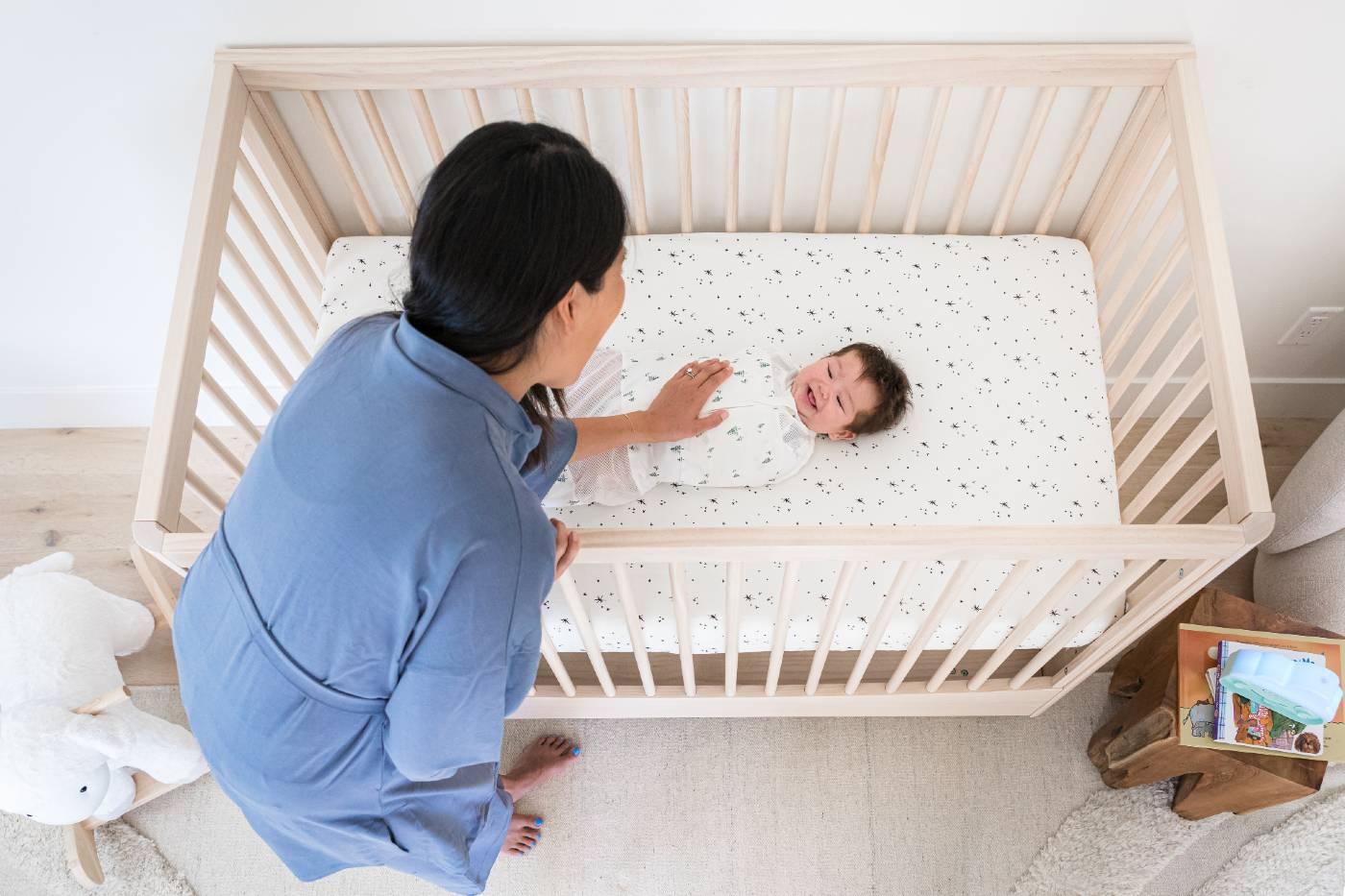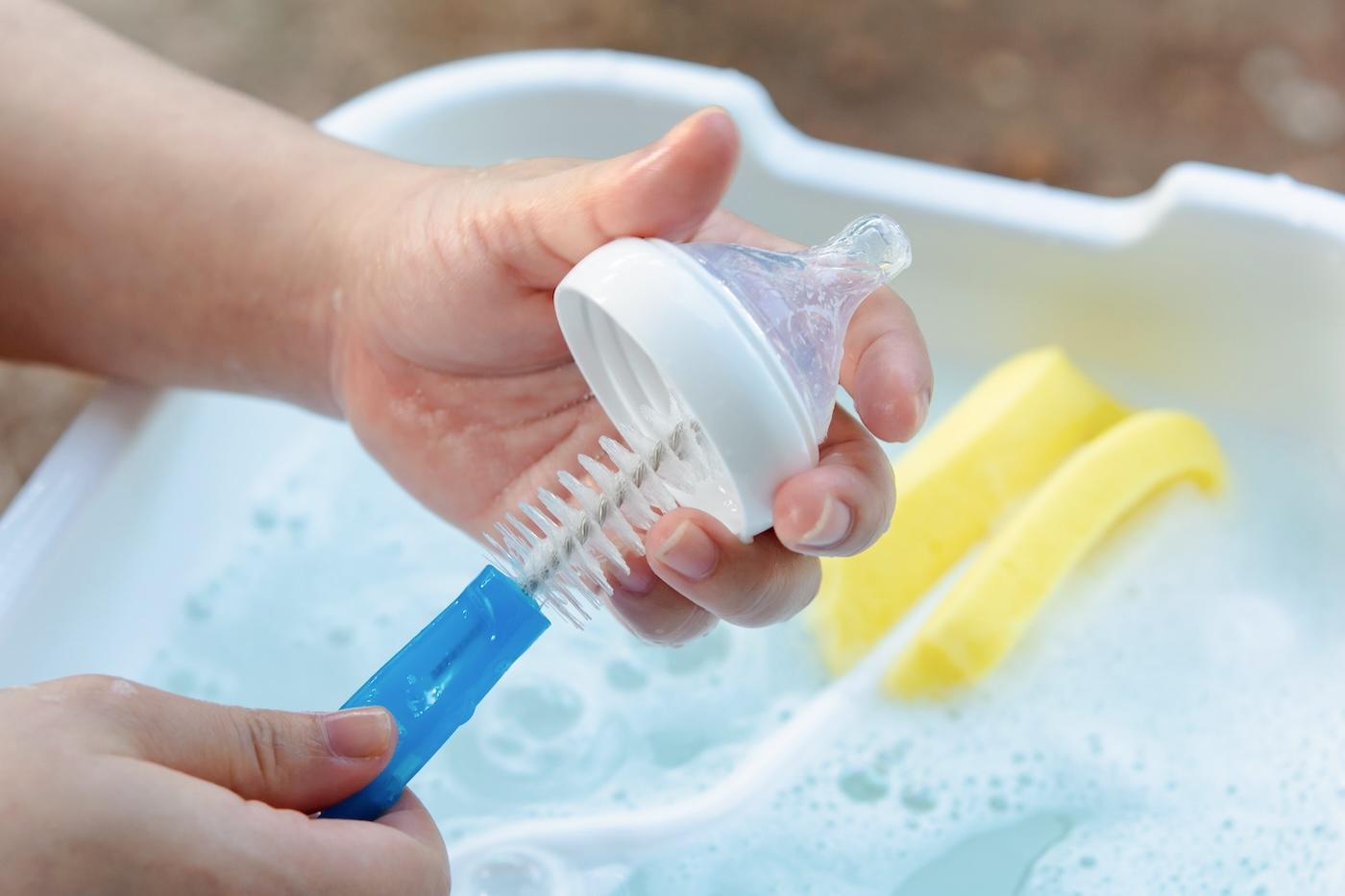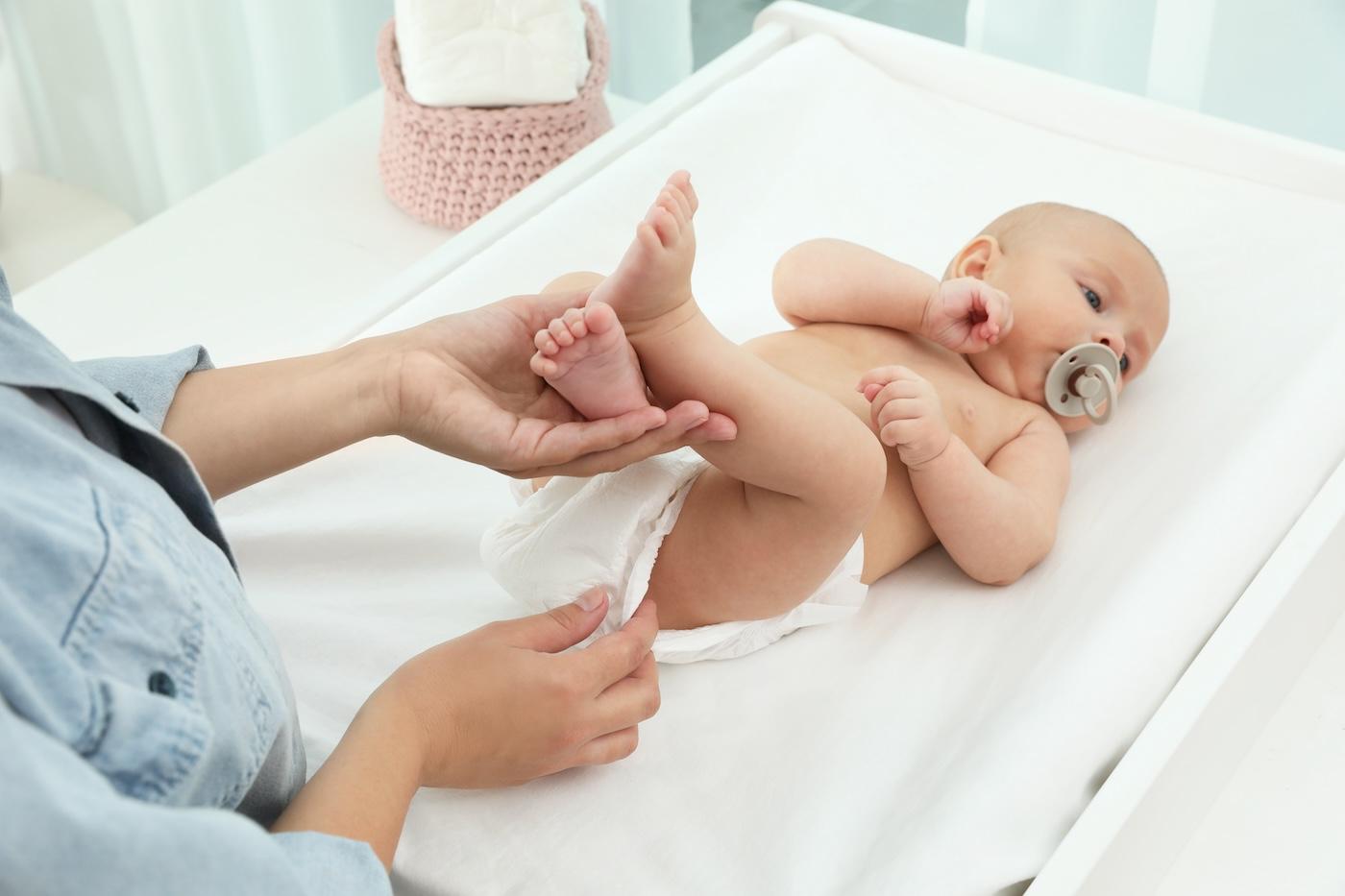BABY
The Best Crib Mattress: What to Look for in a Crib Mattress
Here’s how to select a safe and comfy crib mattress that you and your little one will love.

Written by
Happiest Baby Staff

Shopping for your own mattress is tough. Will it be too cushy…or not cushy enough? Will the mattress trap heat and leave you sweaty in your sleep? Should you buy a mattress that magically springs into a king-size bed after you liberate it from the box? There are so many factors to consider! But you know what’s even trickier than selecting your mattress? Figuring out what kind of crib mattress is best for your baby. Since your bub can’t tell you which mattress they prefer, it’s up to you to decide! Actually, scratch that. It’s not all on your shoulders. We’re here to help with our easy-peasy “how to choose a crib mattress” guide! Here’s all you need to know about selecting the perfect crib mattress for your little one.
Crib Mattress Must: Firmness
While you may loathe sleeping on a too-firm mattress, that’s exactly what kind of mattress is best for babies. The best crib mattresses do not depress under the weight of your little one’s head or body. That means a memory foam crib mattress—which can create an indent, increasing the chance of suffocation if Baby rolls to their tummy—is a big no-go. In fact, the American Academy of Pediatrics (AAP) warns parents that soft and memory foam crib mattresses are “dangerous for infants.”
Crib Mattress Must: Breathability
A high-quality breathable crib mattress allows air to freely flow underneath a baby’s back, which draws excess heat away from their body to keep babies cool and comfy all sleep long. The best breathable crib mattresses are made with a ventilated core that promotes airflow. Just know that while breathability is key for cool and comfortable ZZZs, it remains imperative that parents and caregivers always place babies to sleep on their back for their first year and keep their sleep space free of all loose bedding, pillows, and soft toys. (Learn more about safe sleep.)
Crib Mattress Must: Dual-Sided
When you’re considering what kind of crib mattress is best for Baby, it’s a good idea to consider what kind of crib mattress is best for your toddler, too. After all, many baby cribs can convert into a toddler bed, which means your sweet bub can sleep on the same mattress from infancy all the way through their last day in their toddler bed! If you’re looking for a grow-with-me mattress invest in one that’s dual-sided, meaning that one side of the crib mattress is super-firm and designed for safe infant sleep, while the flip side is slightly cushier and perfect for toddlers and bigger kids to snooze on comfortably. (These types of baby crib mattresses are also called 2-stage crib mattresses or reversible crib mattresses.)
Crib Mattress Must: Washable
Not too long ago there was no such thing as a washable crib mattress. You just put a crinkly mattress protector over your baby’s mattress and hoped for the best. No more! Today’s best crib mattresses are washable. A true gamechanger! You can easily clean some with a damp sponge—but others allow you to slide the mattress cover off to toss in the washing machine. And the best washable crib mattresses let you wash not only the cover, but the mattress core as well. That’s especially helpful when baby blowouts, nighttime sickies, and potty training mishaps inevitably occur.
Crib Mattress Must: Waterproof Barrier
Not all accidents require a full mattress strip-down, from the core to the cover! That’s where the built-in waterproof mattress barrier comes in. It’s crucial for helping keep your little one’s crib mattress clean and hygienic. Look for a crib mattress that features a waterproof barrier that’s breathable, which making cleaning accidents a breeze—without sacrificing your tot’s cooling comfort.
Crib Mattress Must: Hypoallergenic
Because nothing disturbs sleep quite like a giant AH-CHOO, it’s a good idea to consider a hypoallergenic mattress. The best hypoallergenic crib mattresses are fully washable and free of harsh and irritating chemicals like phthalates, BPA, formaldehyde, VOC, glue, and flame retardants. They should also have a removable and washable cover to help keep dust mites, mold, bacteria, and other allergens out.
Crib Mattress Must: Proper Size and Fit
All full-size crib mattresses fit all full-size cribs. (The U.S. Consumer Product Safety Commission regulates standard sizing for cribs and mattresses.) However, while the interior dimensions of every crib made in America must be a standard size, there can be some wiggle room between the crib mattress and the crib itself. In fact, 22% of infant deaths and 26% of nonfatal incidents involve issues with the fit of a crib mattress in the crib or play yard. Infants can become trapped in a gap between the crib mattress and the sidewall of their crib. To be safe, check the fit of your crib and crib mattress. It can also be a good idea to buy your crib mattress and crib from the same manufacturer. You know your crib mattress fits well if there are no gaps larger than two fingers between the sides of the crib and the mattress.
Crib Mattress Must: Lightweight
If you’re asking yourself, Are all crib mattresses created equal? you’ve never hoisted up a hard-to-lift 26-pound mattress during a late-night crib-sheet change! (Never mind dragging that sucker into your living room for family camp-ins in toddlerhood!) Traditional innerspring crib mattresses generally weigh the most, whereas lightweight alternatives can weigh in at just 7 pounds!
Crib Mattress Must: Chemical-Free
Another question to consider when pondering what kind of crib mattress is best for Baby: Is my crib mattress free of harmful chemicals? To find out, look at what your crib mattress is made of. You'll want one that's non-toxic and eco-friendly, ideally made of recyclable, food-grade, naturally derived materials—and without phthalates, BPA, formaldehyde, VOC, glue, and flame retardants. (Learn more about Earth-friendly baby registry musts.)
Crib Mattress Must: Safety
While buying secondhand baby items can be great for the environment and your wallet, it’s best to buy your baby’s crib mattress new. A used crib mattress may not meet current safety regulations, it may be less firm, and there’s a chance that mildew or bacteria could be festering inside. But buying new and ticking off all the above “crib mattress musts” means next to nothing if you don’t ensure your bub’s sleep environment is as safe as can be! That means you need to…
-
Put your baby to sleep on their back for all naps and night sleeps until their first birthday. - Remove and throw out all plastic wrapping that comes with your new crib mattress.
- Make sure the crib sheets securely fit the mattress, ensuring the edges won’t snap up.
- Check to make sure the crib mattress fits snuggly in the crib or toddler bed. You should not be able to fit more than two fingers between the sides of the crib and the mattress.
- Keep the crib free of pillows, blankets, other loose bedding, stuffed toys, wedges, nests, and crib bumpers. (Learn more about what to keep out of Baby’s sleep space.)
- Refrain from hanging anything over the crib that your baby can pull down.
- Place your baby’s crib away from radiators and windows—and ensure strings from blinds or curtains are out of reach.
More Happiest Baby Buying Guides:
- Baby Crib Buying Guide
- What to Look for in a White Noise Machine
- What to Look for in Store-Bought Baby Food
- What to Look for in a Baby Mobile
- Your Guide to Buying the Perfect Toddler Car Seat
- What to Look for in a Nightlight
Disclaimer: The information on our site is NOT medical advice for any specific person or condition. It is only meant as general information. If you have any medical questions and concerns about your child or yourself, please contact your health provider.
SHARE THIS ARTICLE
MOST LOVED
Sleepytime Sidekicks












